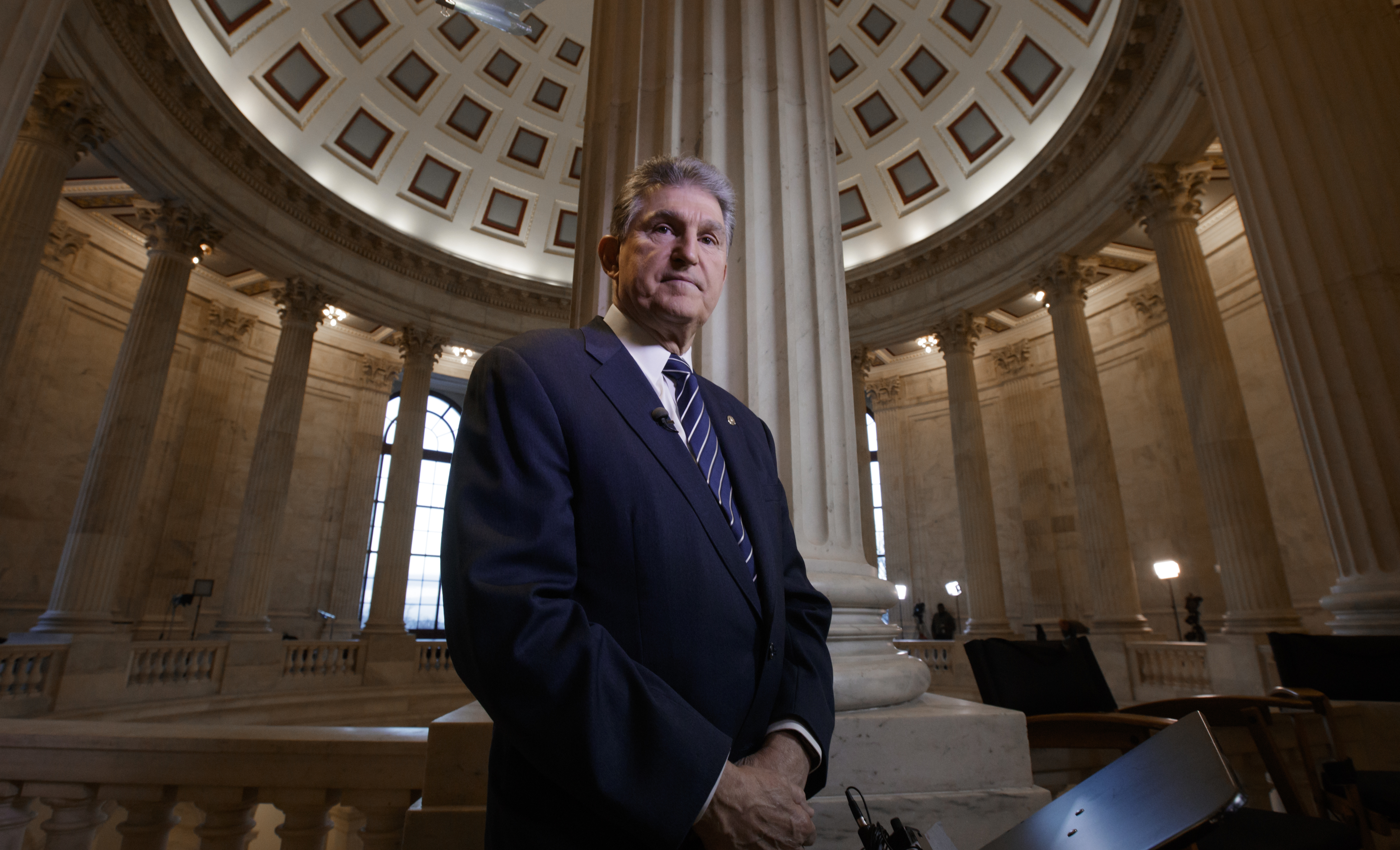Joe Manchin, Vichy Democrat
With Democrats like Joe Manchin, who needs Republicans?


A free daily email with the biggest news stories of the day – and the best features from TheWeek.com
You are now subscribed
Your newsletter sign-up was successful
Democratic lawmakers are finally listening to their enraged base.
It took countless phone calls and raucous, Tea Party-like protests across the country to get the Democrats to listen. But the results have been noticeable: After President Trump's first few nominees mostly sailed through, the Democrats unified to oppose the nomination of Betsy DeVos and, with the help of Republicans Lisa Murkowski and Susan Collins, forced Vice President Mike Pence to break a 50-50 Senate tie. Similarly, nearly every Democrat opposed the nomination of Senate colleague Jeff Sessions for attorney general — no small feat, considering the limp approach some in the caucus were taking just a few short weeks ago.
But there is one exception: Joe Manchin, a Vichy Democrat from West Virginia, voted with every Republican to confirm Sessions. DeVos, it turns out, is the only Trump Cabinet appointment Manchin hasn't supported, a feat that makes him just as reliable a foot soldier for Trump as GOP Sen. Rand Paul. It seems like Trump likes Manchin more, too; the West Virginia Democrat was also considered for a Cabinet post, called Harry Reid's statement after Trump's election an "absolute embarrassment," and, according to the AP, Manchin has a "an open line" to Trump and some of the top figures in the administration.
The Week
Escape your echo chamber. Get the facts behind the news, plus analysis from multiple perspectives.

Sign up for The Week's Free Newsletters
From our morning news briefing to a weekly Good News Newsletter, get the best of The Week delivered directly to your inbox.
From our morning news briefing to a weekly Good News Newsletter, get the best of The Week delivered directly to your inbox.
Some Democrats will no doubt make excuses for Manchin. The obvious one is he's up for re-election in 2018, and his brand of Blue Dog Democratic politics is supposedly the only way Democrats can win in West Virginia. But this is mind-blowing in its defeatism. Not only has the Blue Dog strategy completely fallen apart since 2010 — just 17 Democrats remain as members of the House Blue Dog Coalition — but it doesn't take into account the fact that lefty economic populism has won in West Virginia before. And there are indicators that it can win again.
It's possible that no state has felt the harsh effects of late capitalism more than West Virginia. West Virginia lost over 40 percent of its manufacturing jobs from 1994 to 2016. Coal, by far West Virginia's biggest industry, has lost 35 percent of its jobs since 2011. Nearly a quarter of West Virginian children live in poverty, and West Virginia has been hit harder by the opioid epidemic than any other state.
During the presidential campaign, Hillary Clinton's cringe-inducing promise to "put a lot of coal miners and coal companies out of business" killed her in West Virginia. She lost by more than 40 points. But while Trump's margin of victory was jaw-dropping, so was the fact that only 57 percent of eligible West Virginia voters actually cast a ballot. And given that Trump's promise to "bring coal jobs back" is an empty one that's sure to stir disappointment in a region that overwhelmingly voted for Trump, there's room for Democrats to put forward a viable alternative.
Past West Virginia political figures have shown how it can be done. Democrat Ken Hechler, eulogized in The New York Times in December as "Coal Miners' Champion," served as a congressman for 18 years, his principal achievement being stricter safety regulations for miners in the wake of the 1968 Farmington mine disaster.
A free daily email with the biggest news stories of the day – and the best features from TheWeek.com
Hechler later got elected as West Virginia's secretary of state, where he served four terms. Moreover, Hechler didn't have to throw civil rights under the bus to ensure support in his heavily white state; in fact, as the Times obituary notes, he was reportedly the only member of Congress to participate in the Selma march.
Obviously, West Virginia politics have changed since Hechler's last race in 1996. But what's happening there now clearly isn't working, and sooner or later someone's going to have to take the blame.
This is why progressive groups have to invest heavy resources into places like West Virginia (and South Dakota, and Idaho, and Louisiana), and lose — over and over again — while they lay the groundwork for a long-term movement. Otherwise, there won't be a substantive alternative to the politics that have failed West Virginia and many other parts of the country, and filling the vacuum will be Democrats like Joe Manchin.
After his Sessions vote, it's hard to see how that's acceptable anymore.
Paul Blest is a journalist living in Raleigh, North Carolina. He's a former staff writer for INDY Week and has written for New Republic, Jacobin, VICE, and Salon.
-
 ‘States that set ambitious climate targets are already feeling the tension’
‘States that set ambitious climate targets are already feeling the tension’Instant Opinion Opinion, comment and editorials of the day
-
 Mixing up mixology: The year ahead in cocktail and bar trends
Mixing up mixology: The year ahead in cocktail and bar trendsthe week recommends It’s hojicha vs. matcha, plus a whole lot more
-
 Labor secretary’s husband barred amid assault probe
Labor secretary’s husband barred amid assault probeSpeed Read Shawn DeRemer, the husband of Labor Secretary Lori Chavez-DeRemer, has been accused of sexual assault
-
 The billionaires’ wealth tax: a catastrophe for California?
The billionaires’ wealth tax: a catastrophe for California?Talking Point Peter Thiel and Larry Page preparing to change state residency
-
 Bari Weiss’ ‘60 Minutes’ scandal is about more than one report
Bari Weiss’ ‘60 Minutes’ scandal is about more than one reportIN THE SPOTLIGHT By blocking an approved segment on a controversial prison holding US deportees in El Salvador, the editor-in-chief of CBS News has become the main story
-
 Has Zohran Mamdani shown the Democrats how to win again?
Has Zohran Mamdani shown the Democrats how to win again?Today’s Big Question New York City mayoral election touted as victory for left-wing populists but moderate centrist wins elsewhere present more complex path for Democratic Party
-
 Millions turn out for anti-Trump ‘No Kings’ rallies
Millions turn out for anti-Trump ‘No Kings’ ralliesSpeed Read An estimated 7 million people participated, 2 million more than at the first ‘No Kings’ protest in June
-
 Ghislaine Maxwell: angling for a Trump pardon
Ghislaine Maxwell: angling for a Trump pardonTalking Point Convicted sex trafficker's testimony could shed new light on president's links to Jeffrey Epstein
-
 The last words and final moments of 40 presidents
The last words and final moments of 40 presidentsThe Explainer Some are eloquent quotes worthy of the holders of the highest office in the nation, and others... aren't
-
 The JFK files: the truth at last?
The JFK files: the truth at last?In The Spotlight More than 64,000 previously classified documents relating the 1963 assassination of John F. Kennedy have been released by the Trump administration
-
 'Seriously, not literally': how should the world take Donald Trump?
'Seriously, not literally': how should the world take Donald Trump?Today's big question White House rhetoric and reality look likely to become increasingly blurred
